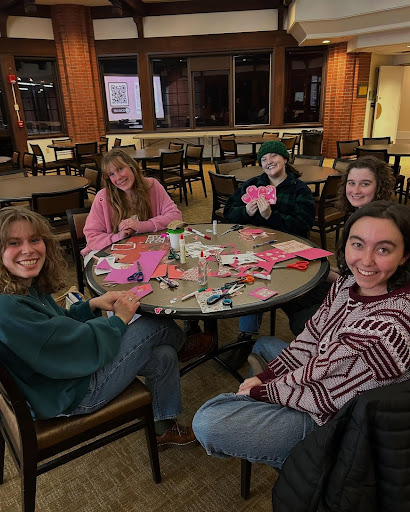TogetHERness: New Women’s Coalition Club Strives To Create Feminist Community on Campus

By Skye Sheehy
Are the current administration’s attacks on gender identity giving you gray hairs? Are you looking for a safe space to laugh, cry and make change? The Women’s Coalition is a new club that aims to provide exactly that. Club president Abby Wieland (‘28) and vice president Josie Thompson (‘27) created the club as a way for students to process the results of the election and build a feminist community on campus. Wieland got the idea for the club the day after the election. I wanted to express my anger, and for other people on campus to express any feelings they might have, anger or sadness or joy,” she said.
Wieland’s participation in her high school’s Women’s Coalition and Thompson’s experience with her high school Human Rights club and her Students For Change program equipped them to lead discussions of current issues and ideologies surrounding women and gender. While the name may imply a girls-only club, the title was only chosen to align with the other coalitions in schools nationwide, and is open to anyone who is interested in learning about and discussing feminism. “Feminism knows no gender, and everyone can engage with feminist practices in their everyday lives, and would benefit from the club,” Thompson said.
The three pillars of the club — education, action, and togetherness — are intended to make sure that students have the opportunity to have real conversations about their rights, and take action to protect them. For example, the ‘Pajamas Against the Patriarchy’ event in March included a Teach-In and a screening of the 2018 Ruth Bader Ginsburg biopic “On the Basis of Sex” followed by a discussion. Thompson emphasizes the importance of these educational conversations. “Talking about things might be hard, because there’s high emotions right now and it’s really easy to feel overwhelmed. But when we talk about these things and find that other people are also feeling the same way, we get that solidarity.”
Simply talking about feminist issues isn’t enough; it’s equally as important to act on the principles the club discusses. A QR code to the U.S. House Switchboard Operator is available at every meeting, allowing students who feel compelled to contact their state representatives about a specific issue to do so. As harmful policies like DEI rollback and abortion restrictions are sweeping the country, providing a concrete course of action can go miles in making people feel empowered to create meaningful change.
The core of the Women’s Coalition is creating an intersectional narrative of feminism through open discussion and collaborative action. “I think it’s really important when talking about feminism, that we are including Black perspectives and other people of color, and just marginalized voices,” Thompson said. “People’s identities intersect, and it’s important to be talking about that, especially when we’re at a PWI, in an echo chamber.” This intersection is not just an issue on college campuses: according to the Institute for Women’s Policy Research, in 2023, white women earned 79.6 cents per dollar earned by men, while Black women earned 66.5 cents and Latina women earned 57.8 cents. It is vital, especially when women’s and transgender rights violations have such a fire lit under them by the current administration, that students are given the tools to tame the blaze.
It can seem like a lot of pressure to participate in a feminist organization, and students may feel hesitant to voice their emotions in what can come across as a high-stakes environment. Thompson stresses that the Women’s Coalition is not meant to be an intimidating space, but rather an educational space where people can share their ideas and experiences in an accepting, supportive setting. “Right now, more than ever, we need community,” she emphasized. “So if you are seeking any sort of community space, no matter your gender identity, you are welcome here, and it’s a space for all.”
